From the Chicago Reader (January 21, 1994); reprinted in Movies as Politics. “Special greetings to Jonathan Rosenbaum, who wrote a very perceptive note on THE LAST BOLSHEVIK,” Chris Marker kindly emailed John Gianvito a little over nine years ago. So I didn’t know how to respond to the news of his sad death, which occurred the day after his 91st birthday in 2012, except to reprint the note he was referring to, as well as a photo of the two of us the only time we met, at Peter von Bagh’s Midnight Sun Film Festival in Finland in 1998 — actually a blurry frame enlargement from Peter’s Sodankylä, Forever. — J.R.
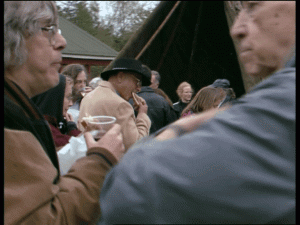
***
**** THE LAST BOLSHEVIK
(Masterpiece)
Edited and written by Chris Marker.
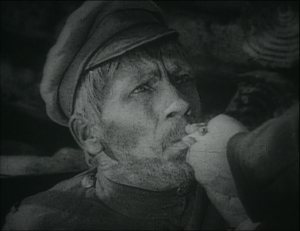
It seems central rather than incidental to the art and intelligence of Chris Marker that he studiously avoids the credit “directed by . . . ” A globe-trotting French filmmaker whose only work of pure fiction with actors is a classic SF short consisting almost exclusively of still photographs (La jetée, 1962), he appears to avoid obvious fiction only in the sense that he finds actuality more than enough grist for the endlessly turning mill of his irony and imagination. Read more
From the Chicago Reader (September 4, 1998). — J.R.
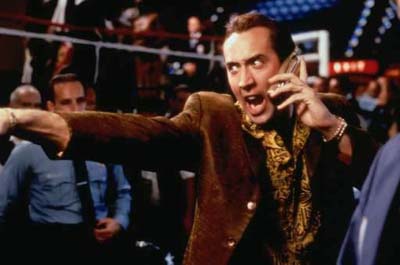
Snake Eyes
Rating ** Worth seeing
Directed by Brian De Palma
Written by David Koepp and De Palma
With Nicolas Cage, Gary Sinise, John Heard, Carla Gugino, Stan Shaw, Kevin Dunn, Michael Rispoli, Joel Fabiani, and Luis Guzman.
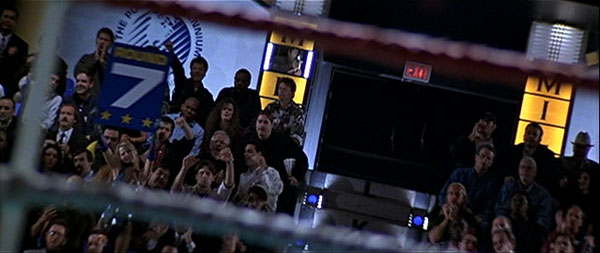
For me, part of the fun of Snake Eyes is the genuine satisfaction of seeing Brian De Palma finally arriving at his own level. Whatever the merits of his imitations and appropriations — of 50s Hitchcock in Dressed to Kill, Obsession, and Body Double, 60s Antonioni in Blow Out, and 30s Hawks in Scarface — and his inflations of TV standbys (The Untouchables, Mission: Impossible), they’ve always suggested he was riding into town on somebody else’s horse. Now, however, he seems more apt to make the 90s equivalents of B movies: such films as Raising Cain, Carlito’s Way, and Snake Eyes are generic stylistic exercises that reveal he’s digested his sources rather than simply devoured and regurgitated them. Though he remains too much of a mannerist to approximate the modest craft of Roy Ward Baker in Don’t Bother to Knock or Richard Fleischer in The Narrow Margin –– thrillers of 1952 that in their adept use of real time and limited settings suggest parallels withSnake Eyes — De Palma’s technique seems more focused for a change. Read more
Even though the following review for the Chicago Reader, originally published on March 27, 1998, is fairly mixed, it seems worth reviving as a reminder of how neglected significant portions of Charles Burnett’s work continue to be. I certainly wouldn’t mind seeing The Final Insult again and reconsidering it. (James Naremore gives it a thoughtful treatment in his excellent recent book on Burnett.)
It’s worth noting that When it Rains is now happily available on DVD, along with Killer of Sheep and My Brother’s Wedding, even though one has to look for it (its placement isn’t made clear on the jacket), on the two-disc set of Killer of Sheep, which also includes two separate versions of My Brother’s Wedding. —J.R.
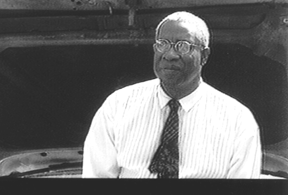
The Final Insult
** Worth seeing
Directed by Charles Burnett
With Ayuko Babu and Charles Bracy.
By Jonathan Rosenbaum
Given the difficulties he had in the 70s and 80s getting his films made and seen, Charles Burnett [see photo at end of article] seemed in danger of becoming the Carl Dreyer of the black independent cinema—the consummate master who makes a film a decade, known only to a small band of film lovers. Seven years passed between Killer of Sheep (1977) and My Brother’s Wedding (1984), and then another six before To Sleep With Anger (1990), which tried and failed to make a dent in the mainstream, as did The Glass Shield (1994). Read more
From the August 14, 1998 Chicago Reader.
The Son of Gascogne
Rating *** A must see
Directed by Pascal Aubier
Written by Patrick Modiano and Aubier
With Grégoire Colin, Dinara Droukarova, Jean-Claude Dreyfus, Laszlo Szabo, Pascal Bonitzer, Otar Iosseliani, Alexandra Stewart, and Jean-Claude Brialy.
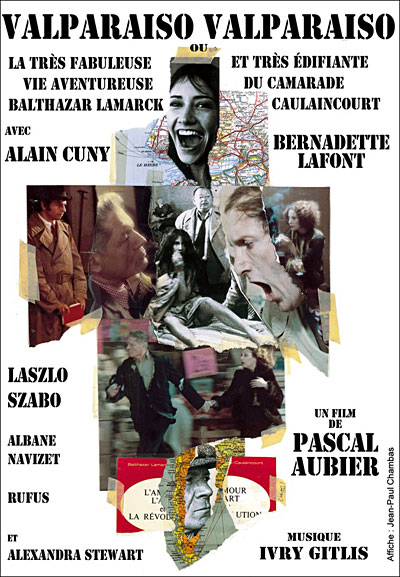
It’s been a full quarter of a century, but I still harbor fond memories of a low-budget French comedy called Valparaiso Valparaiso, a first feature starring Alain Cuny and Bernadette Lafont that I saw at Cannes in 1973. A lighthearted satire about the myopia of romantic French revolutionaries, it details an elaborate hoax perpetrated on a befuddled leftist — a character so absorbed in the glory of departing for Chile to fight the good fight as a special agent that he doesn’t even notice the political struggle going on around him on the French docks when he leaves.
The film was so marginal that two years passed between its completion and its modest premiere at the Director’s Fortnight at Cannes, and you won’t find it mentioned in any of the standard reference books. No, I take that back: Jean-Michel Frodon gives it a third of a sentence in his over-900-page L’Age moderne du Cinéma Français de la Nouvelle Vague à nos jours (1995), linking it with two other films of the early 70s inspired by the French Communist Party and critical of leftists. Read more
From the November 1, 1999 Chicago Reader. — J.R.
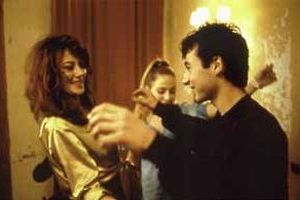
Quentin Tarantino’s cameraman, Lebanese filmmaker Ziad Doueiri, wrote and directed this autobiographical first feature (1998) about his early teens in Beirut — set in 1975, during the onset of the country’s civil war — and cast his younger brother Rami as himself. In fact, Doueiri scores with every member of his wonderful cast, which consists of nonprofessionals in the child roles and seasoned veterans playing the grown-ups. This is one of the best coming-of-age movies I’ve seen, largely because the characters are so full-bodied and believable without falling into predictable patterns. The excellent score is by Stewart Copeland. In French and Arabic with subtitles. 105 min. (JR)
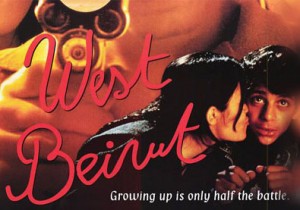
Read more
On Criterion’s very attractive DVD release of Alex Cox’s Walker, there’s a pretty funny bonus feature consisting of Cox reading aloud from the almost exclusively negative and dismissive U.S. reviews that the film received when it came out in 1987. I’m sorry that he doesn’t read from — and apparently wasn’t aware of — my near-rave in the Reader, written during my first year at the paper, so I’m reprinting it here.
For me, this ties in with the surprisingly warm and appreciative welcome accorded to William Klein’s Mr. Freedom (1967) when I showed it in my 60s world cinema course a few years ago. It even sold out every ticket at the Gene Siskel Film Center’s larger auditorium, which I doubt would have happened even in the 60s. I guess it takes a George W. Bush or a Donald Trump to make 60s radicalism both fashionable and available again.
(For more on William Klein, go here.)
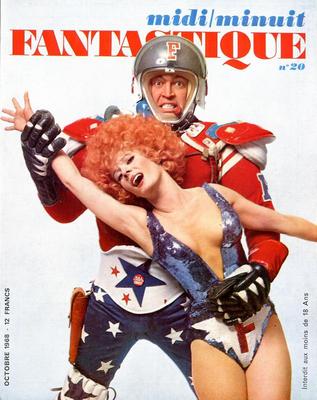
Walker is scripted by the novelist Rudy Wurlitzer — who also wrote Two-Lane Blacktop (also recently released on an excellent Criterion DVD set) and has recently published his first novel in almost a quarter of a century, The Drop Dead of Yonder, a sort of Buddhist Western which I strongly recommend. Read more
I’d completely forgotten about my having written this piece until I came across it recently here, complete with the photo of me (apparently in late 1999) delivering this paper at a panel discussion in Chicago. Apart from correcting a few typos and adding some other photos, I’ve reproduced it here more or less as I found it. (Afterword, April 2, 2015: I’ve done a light edit on this.) — J.R.
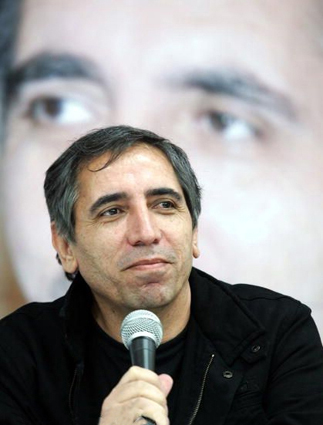
It’s tempting but dangerous to approach artists from exotic cultures in terms of more familiar reference points such as comparing Zhang Yimou’s Ju Dou to The Postman Always Rings Twice or reading Souleymane Cissé’s Brightness as if it were an African Star Wars, as some American and English critics have done. Yet to describe the styles and visions of the two major Iranian filmmakers of the Eighties and Nineties, Abbas Kiarostami and Mohsen Makhmalbaf, I’ve been exploring comparisons to Leo Tolstoy and Fyodor Dostoevsky — a project obviously fraught with booby traps, but one that none the less clarifies some of the important differences between these two major figures.
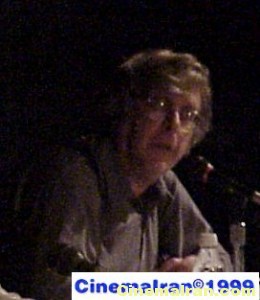
A key difference which has only an oblique relevance to my comparison is that Makhmalbaf has been the most popular and respected filmmaker in Iran in recent years, despite his many run-ins with state censors, while Kiarostami is a hero principally elsewhere. Read more
From the Chicago Reader (November 19, 1999). — J.R.
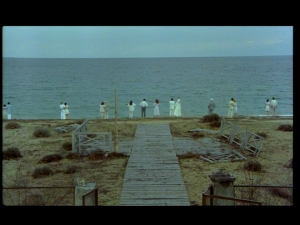
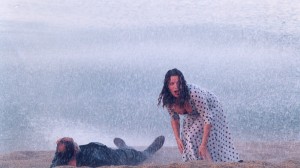
Winner of the 1998 Palme d’Or at Cannes, this rambling but beautiful feature by Theo Angelopoulos may seem like an anthology of 60s and 70s European art cinema: family nostalgia from Bergman and seaside frolics from Fellini; long, mesmerizing choreographed takes and camera movements from Jancso and Tarkovsky; haunting expressionist moods and visions from Antonioni. Yet it’s so stirring and flavorsome — far richer emotionally and poetically than Woody Allen’s derivations — that I was moved and captivated throughout its 132 minutes. Bruno Ganz is commanding as a Greek writer who’s recently learned that he’s terminally ill; the part was conceived for the late Marcello Mastroianni, yet Ganz seems perfect for it (though he’s dubbed by a Greek actor, as Mastroianni undoubtedly would have been). Brooding over the loss of his seaside retreat and family home in Thessaloniki, the hero meets an eight-year-old illegal alien from Albania (Achilleas Skevis) and spends the day crisscrossing the past and visiting his familiar haunts, sometimes in the flesh and sometimes in his imagination, and Angelopoulos is masterful in orchestrating these lyrical and complex encounters. With Isabelle Renauld. Music Box, Friday through Thursday, November 19 through 25. Read more
From the Chicago Reader (September 1, 1999). — J.R.
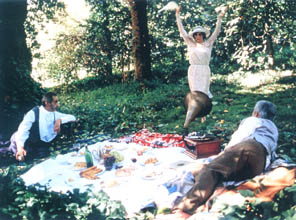
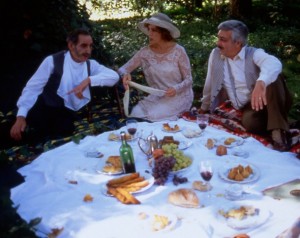
Pushing 100, Portuguese writer-director Manoel de Oliveira is our oldest living film master, which makes it all the more astonishing that he’s averaged one feature a year since the ’80s. His finest work is bound to literature and theater, and this eccentric triptych (1998) is one of its absolute peaks. It consists of a one-act play (Prista Monteiro’s The Immortals) and a story by Antonio Patricio about four people who attend it, one of whom recounts the third story, Agustina Bessa-Luis’s The Mother of the River. The theme of this exquisite masterpiece, linking all three parts, is existential identity, played out in each case by two characters — father and son, playboy and prostitute, young village woman and ancient witch. The witch is played by Irene Papas, and de Oliveira can be seen dancing with his wife in the middle episode. In Portuguese with subtitles. 114 min. (JR)
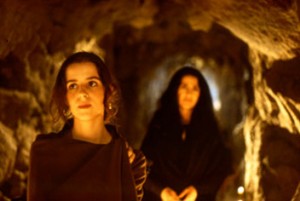 Read more
Read more
From the Chicago Reader (December 1, 2000). — J.R.
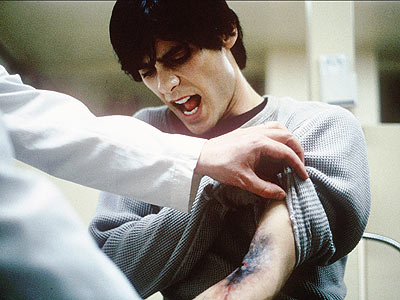
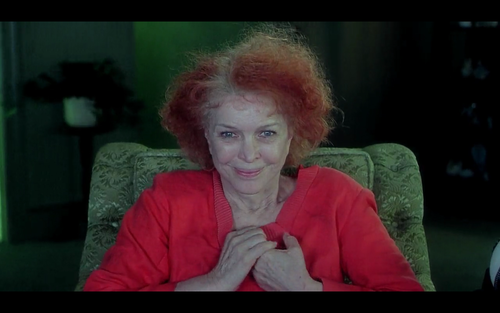
Requiem for a Dream
**
Directed by Darren Aronofsky
Written by Hubert Selby Jr. and Aronofsky
With Ellen Burstyn, Jared Leto, Jennifer Connelly, Marlon Wayans, Christopher McDonald, and Louise Lasser.
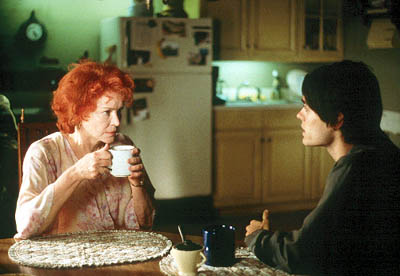
Darren Aronofsky’s first feature, Pi (1998), had more style than substance — or perhaps it’s just that the only thing I now remember with much clarity is its razzle-dazzle style. The black-and-white cinematography and the jazzy editing were pretty attractive in a disposable sort of way, though critic Bill Boisvert had a point when he suggested in these pages that the attitude of this metaphysical thriller was “profoundly anti-intellectual,” rightly adding that this was “true of most indie genius films.” (He may have been more right than he realized. His second example was the 1997 Good Will Hunting, directed by Gus Van Sant, who’s been offering us nothing but anti-intellectual holiday releases about geniuses ever since — with Alfred Hitchcock rather than Norman Bates as the prodigy in the 1998 Psycho remake and Robert Brown taking the equivalent role in Finding Forrester, which opens on Christmas day.)
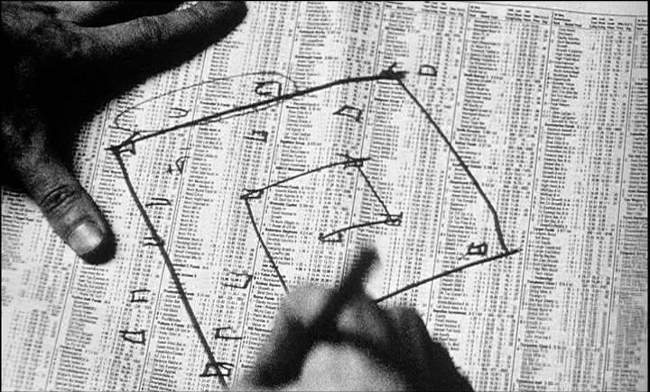

When I belatedly caught up with Aronofsky’s second feature, Requiem for a Dream, it was with the hope of seeing something more than just fancy style. Read more
From the March 1, 2000 Chicago Reader. — J.R.
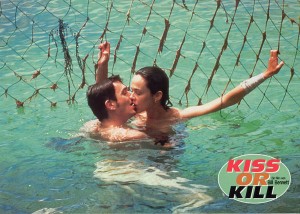
Who needs another killer couple fleeing cross-country with cops in hot pursuit? Yet thanks to this 1998 Australian thriller’s aggressive and unnerving formal approach — jump cuts that hurtle us through the story like a needle skipping across a record and an inventive camera style that defamiliarizes characters as well as settings — the characters’ paranoia is translated into the slithery uncertainty of our own perceptions: this is the most interesting reworking of noir materials I’ve seen since After Dark, My Sweet and The Underneath. The creepy alienation of the lead couple (Frances O’Connor and Matt Day) from their victims and the world in general is eventually replicated in their own relationship, and variations on the same kind of mistrust crop up between the cops pursuing them and in just about every other cockeyed existential encounter in the film. Apart from some juicy character acting and striking uses of landscape, what makes this genre exercise by veteran director Bill Bennett special is the metaphysical climate produced by the style, transforming suspense into genuine dread. The outback is an eyeful too. 95 min. (JR)
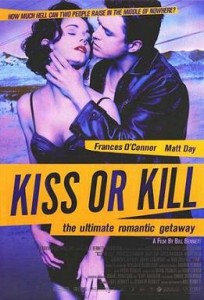 Read more
Read more
This was originally a lecture given at a conference on Godard held in Cerisy, France on August 20, 1998. It subsequently appeared in a printed form somewhat closer to that found below, in Screen magazine (vol 40, no. 3), in Autumn 1999, as part of a Godard dossier assembled by the estimable Michael Witt. But, if memory serves, it took about a year of correspondence and wrangling before anyone on the magazine’s staff agreed to send me any copy of the issue. (Note: for a more general essay and interview with Godard about Histoire(s) du cinéma, go here.) —J.R.
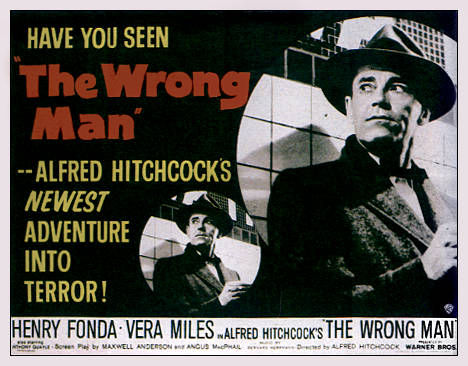
Le Vrai Coupable: Two Kinds of Criticism in Godard’s Work
Jonathan Rosenbaum
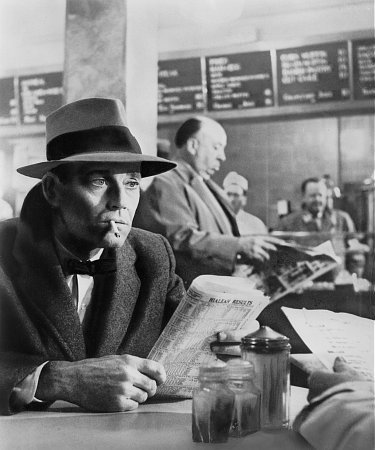
Since the outset of his career, Godard has been interested in two kinds of criticism — film criticism and social criticism — and these two interests are apparent in practically everything he does and says as an artist. The first two critical texts that he published — in the second and third issues of Gazette du cinéma in 1950 — are entitled “Joseph Mankiewicz” and “Pour un cinéma politique”, and his first two features, A bout de souffle and Le petit soldat, made about a decade later, reflect the same dichotomy. Read more
From the Chicago Reader (February 6, 1998). — J.R.
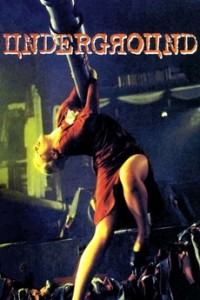
Though slightly trimmed by director-writer Emir Kusturica for American consumption, this riotous 167-minute satirical and farcical allegory about the former Yugoslavia from World War II to the postcommunist present is still marvelously excessive. The outrageous plot involves a couple of anti-Nazi arms dealers and gold traffickers who gain a reputation as communist heroes. One of them (Miki Manojlovic) installs a group of refugees in his grandfather’s cellar, and on the pretext that the war is still raging upstairs he gets them to manufacture arms and other black-market items until the 60s, meanwhile seducing the actress (Mirjana Jokovic) that his best friend (Lazar Ristovski) hoped to marry. Loosely based on a play by cowriter Dusan Kovacevic, this sarcastic, carnivalesque epic won the 1995 Palme d’Or at Cannes and has been at the center of a furious controversy ever since for what’s been called its pro-Serbian stance. (Kusturica himself is a Bosnian Muslim.) However one chooses to take its jaundiced view of history, it’s probably the best film to date by the talented Kusturica (Time of the Gypsies, Arizona Dream), a triumph of mise en scene mated to a comic vision that keeps topping its own hyperbole. Read more
From the Chicago Reader (Mar 1, 1998). — J.R.
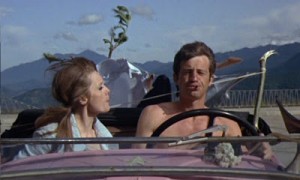
After his first two features in the early 60s (The Love Game, The Five-Day Lover), Philippe de Broca, a former assistant to Francois Truffaut and Claude Chabrol, was taken by some to be a member of the French New Wave — an impression that was quickly undermined by the glossy commercial fare that followed, including this enjoyable 1964 thriller romp with Jean-Paul Belmondo and Francoise Dorleac. If memory serves, this is swell light entertainment — there’s a nice score by Georges Delerue, and the original screenplay was nominated for an Oscar — designed to autodestruct as soon as you see it. (JR)
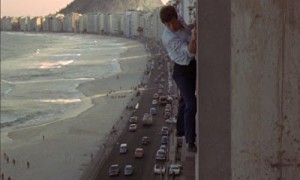
Read more
From Chicago Reader (August 1, 1998). — J.R.
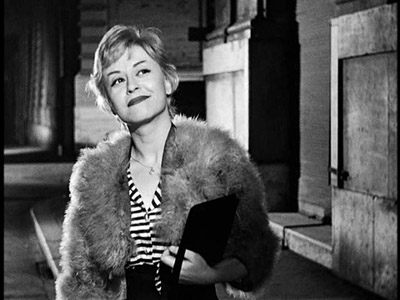
Federico Fellini’s restored 1957 masterpiece, starring his wife, Giulietta Masina. Though the additional scene — an incident involving a man who distributes food and clothing to the homeless — may have little consequence in terms of the overall plot, it changes one’s thematic and spiritual sense of the whole film. The story basically consists of five lengthy episodes in the life and career of a prostitute who repeatedly becomes disillusioned but keeps finding the resources to believe in romantic love just the same. Masina’s exaggerated grimaces and clownlike features, which hark back to the tradition of silent comics, are undoubtedly mannerist, but part of Fellini’s mastery is to make them necessary correlatives to his own vision of innocence. Too melodramatic and fanciful in turn to qualify as neorealism in the usual sense, despite the gritty Roman street slang contributed by Pier Paolo Pasolini, this gains immeasurably, like many other Fellini films, from Nino Rota’s wistful music. In Italian with subtitles. 117 min. (JR)
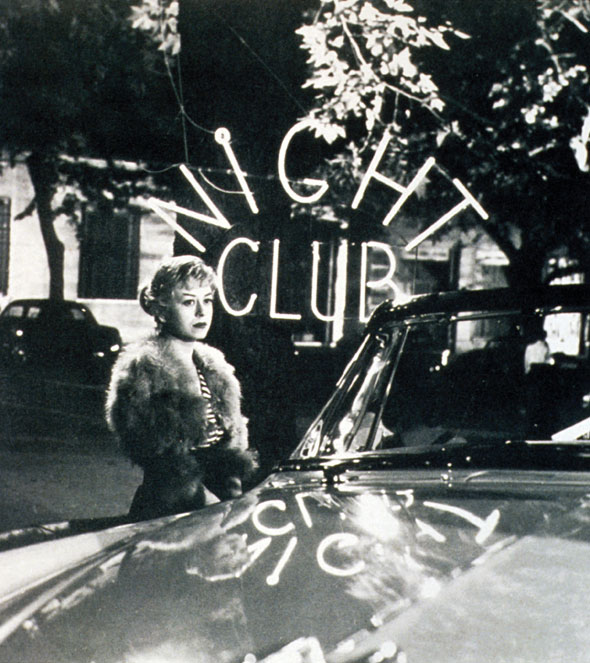 Read more
Read more































